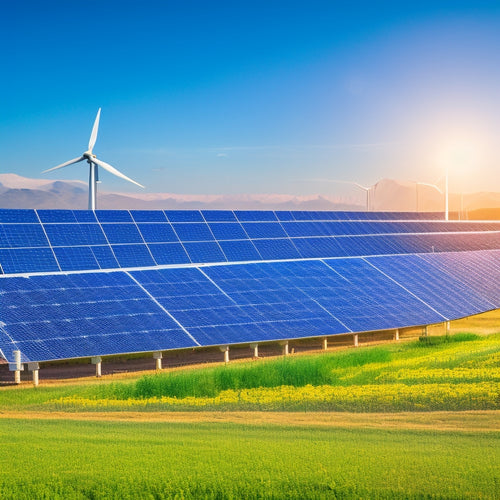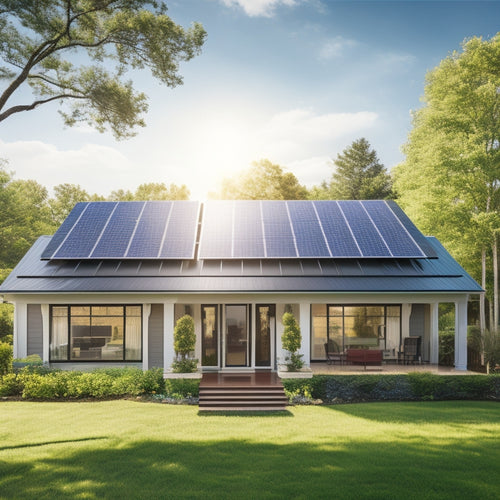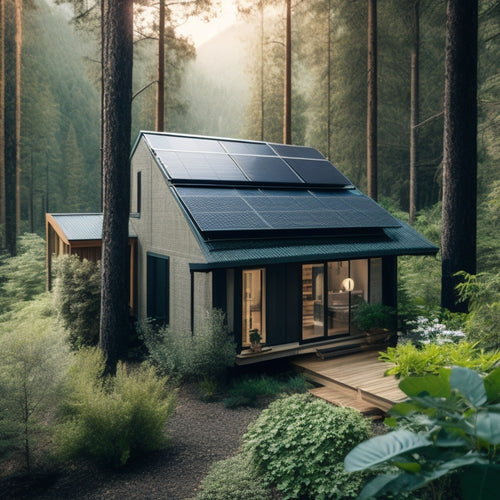
Why Are Off Grid Energy Storage Systems So Effective
Share
Off-grid energy storage systems are effective because they promote energy independence and deliver long-term savings. By allowing you to generate and store your own electricity, these systems reduce reliance on traditional utility grids, safeguarding you from fluctuating energy prices. They employ advanced technology for efficient energy management, which leads to lower maintenance costs and a smaller carbon footprint. Furthermore, effective sizing based on your energy consumption guarantees ideal performance. This combination of cost-effectiveness and environmental benefits makes off-grid systems an attractive choice. Exploring further reveals how these advantages can align with your energy goals.
At a Glance
- Off-grid energy storage systems reduce long-term energy bills and provide financial benefits through self-sufficient electricity generation and government incentives.
- These systems offer energy independence, allowing users to control their energy supply and reduce reliance on utility providers.
- They minimize dependence on traditional power grids, protecting users from rising utility costs and market fluctuations.
- Off-grid systems contribute to a reduced carbon footprint by utilizing renewable energy sources and decreasing fossil fuel reliance.
- Proper system sizing and energy management strategies enhance efficiency, ensuring long-term viability and sustainability of off-grid solutions.
Cost-Effective Long-Term Solution
Investing in off-grid energy storage systems can notably reduce your energy bills over time.
By leveraging renewable energy sources such as solar and wind, homeowners can store excess energy for later use, ultimately leading to long-term savings.
With various government incentives available, you can lower your initial costs and improve your return on investment.
This approach not only enhances your energy independence but also offers a sustainable financial solution for the long term, contributing to a sustainable lifestyle.
Reduced Energy Bills
A significant advantage of off-grid energy storage systems is their potential to drastically reduce energy bills over time. By utilizing renewable energy sources, such as solar or wind, you can generate your own electricity, minimizing dependence on utility providers. This independence not only stabilizes your energy costs but also shields you from rising energy prices.
Integrating smart technology enhances your energy efficiency, allowing you to optimize your consumption patterns. With real-time data monitoring, you can identify peak usage times and adjust your energy use accordingly. This proactive approach guarantees that you're utilizing stored energy when it's most advantageous, maximizing savings.
Moreover, the initial investment in off-grid systems pays off in the long run. As energy prices fluctuate, having a self-sufficient energy system means you won't be at the mercy of external market forces. The combination of renewable energy generation and advanced storage capabilities results in a persuasive financial strategy that supports your autonomy.
Ultimately, moving to an off-grid energy storage system isn't just a lifestyle choice; it's a smart financial decision that leads to significant savings on your energy bills while promoting sustainability and freedom from traditional energy sources.
Government Incentives Available
Many homeowners and businesses are unaware of the various government incentives available for off-grid energy storage systems, which can greatly enhance the cost-effectiveness of this long-term solution. By leveraging tax credits and federal incentives, you can considerably reduce your initial investment.
Many states offer grant programs and installation subsidies that further lower costs. These incentives promote renewable energy adoption, aligning with your desire for energy independence.
Financing options are also available, making it easier to manage upfront expenses. Some states have strong policy support that encourages community initiatives aimed at enhancing energy resilience.
Energy rebates provided by local utilities can further offset installation costs and encourage the shift to off-grid systems.
To maximize your savings, it's crucial to research specific state programs that apply to your area. These programs often vary regarding eligibility and benefits, so staying informed can lead to substantial financial advantages.
Sustainable Energy Independence
Achieving sustainable energy independence means enhancing your energy autonomy while considerably reducing utility dependency.
By employing off-grid energy storage systems, you can generate and store your own power, allowing for greater control over energy use. This shift not only stabilizes your energy supply but also mitigates the risks associated with rising utility costs.
Additionally, energy independence allows for freedom from traditional power grids, particularly beneficial for those in remote areas.
With the right design and efficient energy storage, off-grid systems can guarantee reliable power even during low sunlight periods.
Enhanced Energy Autonomy
Enhanced energy autonomy represents a critical step toward sustainable energy independence, allowing individuals and communities to capture and store energy from renewable sources effectively.
By implementing off-grid energy storage systems, you gain control over your energy supply, promoting energy resilience against fluctuating market prices and grid failures.
Recent technology advancements have greatly improved the efficiency and scalability of these systems.
With batteries enabling longer storage durations and solar panels with higher energy conversion rates, you can maximize your renewable energy capturing. This not only increases your capability to meet your energy needs but also enhances your self-sufficiency.
Furthermore, as you integrate smart technologies into your energy systems, real-time monitoring and management enable you to optimize energy consumption and storage.
This analytical approach allows for better decision-making, ensuring that you make use of energy resources intelligently.
Ultimately, enhanced energy autonomy isn't just about convenience; it's about liberating yourself from the constraints of conventional energy sources.
Reduced Utility Dependency
Regularly reducing utility dependency is a fundamental goal for achieving sustainable energy independence. When you invest in off-grid energy storage systems, you enhance your energy resilience and minimize your reliance on traditional utility providers. This shift not only enables you to generate and store your own energy but also guarantees that your system's reliability remains intact, regardless of external fluctuations in the grid.
By utilizing renewable energy sources like solar or wind, you create a self-sufficient energy ecosystem capable of meeting your needs. This independence shields you from rising utility costs and potential service interruptions, granting you greater control over your energy future. You can optimize your energy consumption patterns, storing excess energy for later use, further reinforcing your autonomy.
Moreover, a reduced dependency on utilities promotes a more sustainable lifestyle. It encourages the adoption of efficient practices and technologies, ultimately benefiting both your wallet and the environment.
As you accept this shift, you cultivate a strong energy system customized to your needs, guaranteeing that you're not just surviving but thriving in an increasingly unpredictable energy environment.
Key Advantages of Off-Grid Systems
Off-grid systems provide you with energy independence by allowing you to generate and store your own power, reducing reliance on traditional utilities.
Over time, these systems can lead to significant cost savings, as you eliminate monthly energy bills and potential rate increases.
Understanding these key advantages can help you make informed decisions about your energy future.
Energy Independence Benefits
In today's energy environment, achieving energy independence offers significant advantages for individuals and communities alike. By utilizing renewable sources, you can create a self-sustaining energy system that minimizes reliance on traditional power grids. This autonomy not only enhances your control over energy production but also buffers you against fluctuations in energy prices and supply shortages.
Implementing off-grid energy storage systems promotes energy resilience. When you generate and store your energy, you're less vulnerable to outages caused by extreme weather events or infrastructure failures. This resilience is particularly essential for remote areas where grid access is limited or unreliable.
Moreover, energy independence enables you to make environmentally conscious choices. By prioritizing renewable sources, you contribute to a sustainable future while reducing your carbon footprint.
In essence, off-grid systems provide a pathway to energy independence, allowing you to enjoy the freedom and security that come with self-sufficiency. You gain not only reliable energy but also the peace of mind that comes from knowing you're in control of your energy destiny.
Embracing this approach leads to a more resilient, sustainable lifestyle.
Cost Savings Over Time
Choosing to implement an off-grid energy storage system can lead to significant cost savings over time, especially as energy prices continue to rise. While the initial investment may seem substantial, the long-term benefits often outweigh these upfront costs. Advanced battery types and improved installation processes enhance energy efficiency, reducing your reliance on grid power.
Maintenance costs for off-grid systems typically remain lower than those associated with traditional grid-based solutions. With proper performance monitoring, you can maximize system longevity, ensuring that your investment pays off over years.
Additionally, technology advancements have improved system scalability, allowing you to expand your energy storage capacity as your needs grow without incurring exorbitant costs.
As you integrate your off-grid system with existing energy sources, the financial advantages become even clearer. By actively managing your energy consumption and leveraging grid integration when necessary, you maintain control over your expenses.
This proactive approach grants you freedom from fluctuating energy prices, translating to consistent savings. Ultimately, an off-grid energy storage system not only enables you but also supports your financial independence in a rapidly changing energy environment.
Selecting Based on Energy Usage
To effectively select an off-grid energy storage system, you must first assess your energy consumption patterns.
Understanding your daily and seasonal energy demands allows for ideal sizing of the system, ensuring it meets your needs without excess capacity.
This energy needs assessment process helps optimize efficiency and cost-effectiveness in your energy setup.
Assessing Energy Consumption Patterns
Understanding your household's energy consumption patterns is essential for selecting the most effective off-grid energy storage system. Start by conducting energy audits to capture detailed consumption metrics and identify energy usage trends over time. This efficiency analysis will reveal your peak demand periods, allowing you to understand when your energy needs are at their highest.
Next, observe your behavioral patterns; recognize how your daily routines affect energy consumption variability. For instance, if you notice significant spikes in usage during specific hours, you can implement load management strategies to optimize your energy storage capacity.
Usage forecasting can also help predict future consumption trends, enabling you to prepare your system accordingly.
Ideal Sizing for Systems
Determining the ideal size for your off-grid energy storage system hinges on a thorough analysis of your energy usage. Start by evaluating your daily consumption patterns through usage monitoring; this will help you understand your battery capacity needs.
Implement energy forecasting techniques to predict future consumption, allowing for proactive system design.
Load management plays an essential role in sizing your system effectively. By employing strategies like peak shaving, you can reduce the demand during high-consumption periods, enhancing overall efficiency optimization.
Consider recent technology advancements in battery systems which improve performance and lifespan, making them more suitable for off-grid applications.
Incorporate lifecycle analysis to evaluate the long-term viability of different storage options. This analysis should include maintenance practices, ensuring your system remains operational with minimal downtime.
Ultimately, the goal is to create a system that not only meets your current energy needs but also adapts to future demands.
Lower Environmental Impact
When you implement off-grid energy storage systems, you're actively contributing to a reduced carbon footprint.
These systems utilize renewable energy sources, minimizing reliance on fossil fuels and decreasing greenhouse gas emissions.
Reduced Carbon Footprint
Off-grid energy storage systems greatly reduce your carbon footprint by utilizing renewable energy sources like solar and wind. By utilizing these clean energy options, you minimize reliance on fossil fuels, which are major contributors to greenhouse gas emissions. This shift not only benefits the environment but also enables you to achieve energy independence.
With off-grid systems, you can implement carbon sequestration techniques that further improve your sustainability efforts. By capturing and storing carbon, you can actively reduce the amount of CO2 released into the atmosphere. This proactive approach allows you to take control of your environmental impact while cultivating a greener future.
Moreover, integrating energy storage guarantees that you can use renewable energy consistently, even when conditions aren't ideal. This reliability translates to lower emissions over time, as you're less likely to resort to backup generators powered by fossil fuels.
In essence, adopting off-grid energy storage systems means embracing an effective strategy for reducing your carbon footprint. By choosing renewable energy sources and employing carbon sequestration techniques, you not only liberate yourself from conventional energy constraints but also contribute considerably to a healthier planet.
Frequently Asked Questions
How Do Off-Grid Systems Compare to Traditional Energy Sources?
Off-grid systems offer superior solar integration, enhancing energy independence and reliability. They're cost-efficient with a reduced environmental impact, while system scalability and technological advancements improve user experience, making them an attractive alternative to traditional energy sources.
What Maintenance Is Required for Off-Grid Energy Storage Systems?
About 70% of off-grid systems require regular monitoring to guarantee efficiency. You'll need to check battery lifespan and replace batteries every 5-15 years, depending on usage, to maintain peak performance and energy independence.
Can Off-Grid Systems Power Large Appliances Simultaneously?
Yes, off-grid systems can power large appliances simultaneously, provided you consider their power capacity and appliance compatibility. Effective energy management and load balancing guarantee you employ available energy without overloading your system, maximizing efficiency and freedom.
What Types of Batteries Are Best for Off-Grid Storage?
Imagine a wise owl choosing between two paths. Lithium offers quick energy and seamless solar integration, while lead acid provides longevity. Your choice hinges on battery capacity and your quest for energy independence. Choose wisely.
How Does Weather Affect Off-Grid Energy Performance?
Weather considerably impacts your off-grid energy performance. Solar efficiency drops with temperature extremes, while wind variability affects energy production. Seasonal changes can influence battery lifespan, making it essential to monitor these factors for ideal system management.
Explore More
In the quest for energy independence, off-grid storage systems stand out as a revolutionary solution. You're not just investing in technology; you're securing long-term savings and reducing your carbon footprint. As you weigh your energy needs, consider the advantages these systems offer. Will you take the leap into sustainable living? The choice is yours, and with it comes the promise of a greener future. Don't just imagine the possibilities—embrace them and change your energy environment today.
Related Posts
-

The Role of Battery Monitoring Systems in Renewable Energy
Battery monitoring systems play an essential role in renewable energy by enhancing system longevity and optimizing pe...
-

Home Solar Installation Cost
You're considering installing solar panels on your home, and the upfront cost is likely the biggest hurdle standing i...
-

Off Grid Solar Batteries
As you shift to off-grid living, you'll rely on high-performance solar batteries to store excess energy generated by ...


